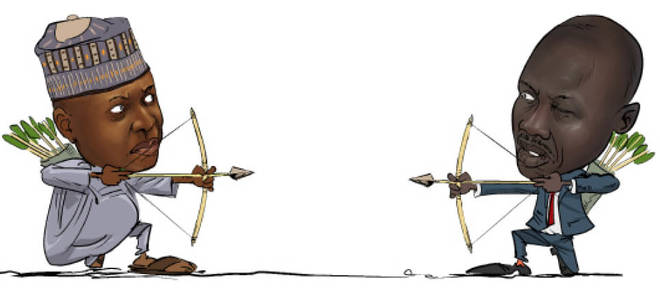Saraki’s CCT trial: One war, many battles
The decision of Senate President Bukola Saraki and the Economic and Financial Crimes Commission (EFCC) to cross appeal against the judgement of the Court of Appeal in Abuja which ordered Saraki to face trial on three counts charges is set to prompt a protracted legal proceeding. In the wake of the judgement by a three-member […]


The decision of Senate President Bukola Saraki and the Economic and Financial Crimes Commission (EFCC) to cross appeal against the judgement of the Court of Appeal in Abuja which ordered Saraki to face trial on three counts charges is set to prompt a protracted legal proceeding.
In the wake of the judgement by a three-member panel presided by Justice Tinuade Akomolafe-Wilson, which also dismissed 15 of the 18 counts amended charges against Saraki at the Code of Conduct Tribunal (CCT), the legal team of the EFCC led by Rotimi Jacobs (SAN), said it will challenge aspects of the judgment particularly, the pronouncement by the appellate court that “burden of proof rests squarely with the prosecution”, which it failed to discharge.
Also, one of the senior defence lawyers, Paul Erokoro (SAN) stressed that after studying the judgement the legal team “is definitely going to appeal against the judgment.”
The bone of contention is now the counts four, five and six. The first two counts, which the panel said Saraki should provide an explanation to the tribunal, has to do with some discrepancies in the account by the defendant on the acquisition of the two properties: 17A McDonald and 17B McDonald, Ikoyi, Lagos in the assets declaration form made at the end of his tenure governor of Kwara State in 2011 and assumption of office as a senator when he allegedly declared falsely that the properties were acquired from the proceeds of the sale of rice and sugar, whereas he acquired them through a total sum of N497.2 million through a loan from the Guaranty Trust Bank Plc.
Since the commencement of the case on September 11, 2015 when the EFCC applied for leave to prefer the criminal charges at the CCT, it has been a long-drawn war fought on different fronts, with both sides sparing no efforts in what is viewed by some as executive-legislative confrontation.
First, on getting wind of the charge, Saraki approached a Federal High Court in Abuja with an application to enforce his fundamental human right, and another application before the Court of Appeal challenging the jurisdiction of the tribunal to try the country’s third citizen.
When Saraki failed to appear on the next sitting being September 18, 2015 Justice Danladi Umar of the CCT issued a warrant of arrest to the Inspector General of Police (IGP) and other security agencies to arrest and produce him in court.
All was set for the arraignment on September 22, 2015 on an initial 13-counts charge. The Court of Appeal on September 21, 2015 refused an ex parte application by defence counsel, Joseph Daudu (SAN) for an injunction to stop the bench warrant issued against Saraki and to suspend proceedings at the tribunal pending the determination of the main appeal against the panel’s jurisdiction.
Temporary reprieve came the way of Saraki when a Supreme Court on November 15, 2015 stopped the trial at the tribunal pending the determination of the appeal challenging its jurisdiction to try the matter, after the defence had submitted that the panel was not properly constituted having only two members. He had argued that the Attorney General of the Federation (AGF) has no powers to prosecute the case, except the Code of Conduct Bureau (CCB).
However, on February 5, 2016, a three-member panel of justices of the Supreme Court presided by Justice Walter Onnoghen, now the Chief Justice of Nigeria (CJN), ordered Saraki to face trial at the CCT. The apex court said the tribunal was empowered with quasi-criminal jurisdiction powers, adding that the tribunal can validly sit with only the chairman and one member.
But on April 25, 2016, Saraki’s counsel, Kanu Agabi (SAN) argued another appeal before the Court of Appeal in Abuja seeking to stay proceedings at the tribunal pending the determination of the application on jurisdiction of the tribunal. Though he withdrew the initial relief for stay and instead requested for accelerated hearing in the application challenging the jurisdiction of the CCT to try his client.
The trial in Saraki’s case commenced in earnest in April, 2016 as EFCC tendered 48 exhibits, while the defence tendered two exhibits and made about 12 grounds of objection all bordering on the jurisdiction of the tribunal. The first witness to testify was Michael Wetkast, leader of EFCC inter-agency team that investigated Saraki, who testified from March to August, 2016.
EFCC presented other witnesses such as: Nwachukwu Amazu, Head of Fund Transfer of the Guaranty Trust Bank plc, who testified from January 17, 2017; Samuel Madojemu, Head, Intelligence Unit of the Code of Conduct Bureau (CCB), who testified between February and April, 2017 and Alvan Gurumnaan, a senior detective representing the Director of Operations with the EFCC, who testified on May 10, 2017.
With the Court of Appeal deciding the appeal by the EFCC against the ruling of the CCT, observers are looking forward to the proceeding at the Supreme Court.
